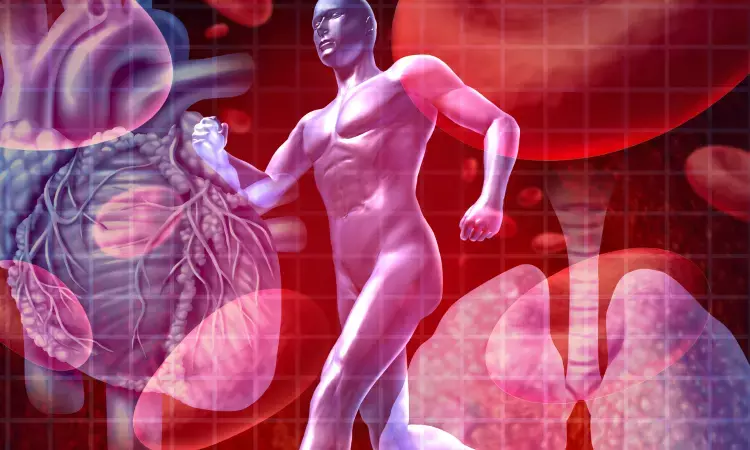- Home
- Medical news & Guidelines
- Anesthesiology
- Cardiology and CTVS
- Critical Care
- Dentistry
- Dermatology
- Diabetes and Endocrinology
- ENT
- Gastroenterology
- Medicine
- Nephrology
- Neurology
- Obstretics-Gynaecology
- Oncology
- Ophthalmology
- Orthopaedics
- Pediatrics-Neonatology
- Psychiatry
- Pulmonology
- Radiology
- Surgery
- Urology
- Laboratory Medicine
- Diet
- Nursing
- Paramedical
- Physiotherapy
- Health news
- Fact Check
- Bone Health Fact Check
- Brain Health Fact Check
- Cancer Related Fact Check
- Child Care Fact Check
- Dental and oral health fact check
- Diabetes and metabolic health fact check
- Diet and Nutrition Fact Check
- Eye and ENT Care Fact Check
- Fitness fact check
- Gut health fact check
- Heart health fact check
- Kidney health fact check
- Medical education fact check
- Men's health fact check
- Respiratory fact check
- Skin and hair care fact check
- Vaccine and Immunization fact check
- Women's health fact check
- AYUSH
- State News
- Andaman and Nicobar Islands
- Andhra Pradesh
- Arunachal Pradesh
- Assam
- Bihar
- Chandigarh
- Chattisgarh
- Dadra and Nagar Haveli
- Daman and Diu
- Delhi
- Goa
- Gujarat
- Haryana
- Himachal Pradesh
- Jammu & Kashmir
- Jharkhand
- Karnataka
- Kerala
- Ladakh
- Lakshadweep
- Madhya Pradesh
- Maharashtra
- Manipur
- Meghalaya
- Mizoram
- Nagaland
- Odisha
- Puducherry
- Punjab
- Rajasthan
- Sikkim
- Tamil Nadu
- Telangana
- Tripura
- Uttar Pradesh
- Uttrakhand
- West Bengal
- Medical Education
- Industry
Elevated lipoprotein (a) levels predisposing factor for CVD among adults, confirms study

Finland: A recent investigation published in AHA Journal, American Heart Association Journal, "CIRCULATION" has concluded that Elevated Lipoprotein (a) [Lp(a)] levels in youth increase the risk of adult atherosclerotic cardiovascular outcomes. This is not related to increased carotid intima-media thickness, added researchers.
It is already known that Elevated Lp(a) levels are related to cardiovascular disease and are a common risk factor. The mechanism is unknown.
The present study conducted by a group of researchers led by Dr Raitakari, Centre for Population Health Research, examined the potential role of Lp (A) in youth and the increased risk of developing ASCVD (adult atherosclerotic cardiovascular disease).
The study design and key results are summarised below:
• In YFS (Young Finns Study), Lp(a) levels were measured in youth aged 9 - 24 and associated with adult ASCVD and carotid intima-media thickness.
• The results of the YFS study were replicated with the data used for White participants from the Bogalusa Heart Study, BHS.
• Cox proportional hazard regression model was used in analyses.
• In YFS, those exposed to higher Lipoprotein (a) level of ≥30 mg/dL in youth had ≈a two times greater risk of developing adult ASCVD than those not exposed. The hazard ratio was 2.0, and 95 % confidence interval.
• Lp(a), low-density lipoprotein cholesterol, BMI, and smoking, were independently associated with higher risk.
• In BHS, white individuals exposed to high Lp(a) had a 2.5 times greater risk (95% Confidence Interval) of developing adult ASCVD compared to those nonexposed individuals.
• Despite adjustment for low-density lipoprotein cholesterol and body mass index, there was no change in risk associated with high Lp(a) with a hazard ratio of 2.4 and 95% Confidence Interval.
• The individuals exposed to high Lp(a) had a 2.0 times greater risk of developing adult ASCVD as per the multivariable model for pooled data compared to individuals who were not exposed.
• There was no association detected between youth Lp(a) and adult carotid artery thickness ( cohort or pooled data).
The researchers concluded, "The elevated Lp(a) levels is a risk factor for adult atherosclerotic cardiovascular outcomes in youth but not for increased carotid intima-media thickness."
Further reading:
Lipoprotein(a) in Youth and Prediction of Major Cardiovascular Outcomes in Adulthood. Olli Raitakari et al.
BDS, MDS in Periodontics and Implantology
Dr. Aditi Yadav is a BDS, MDS in Periodontics and Implantology. She has a clinical experience of 5 years as a laser dental surgeon. She also has a Diploma in clinical research and pharmacovigilance and is a Certified data scientist. She is currently working as a content developer in e-health services. Dr. Yadav has a keen interest in Medical Journalism and is actively involved in Medical Research writing.
Dr Kamal Kant Kohli-MBBS, DTCD- a chest specialist with more than 30 years of practice and a flair for writing clinical articles, Dr Kamal Kant Kohli joined Medical Dialogues as a Chief Editor of Medical News. Besides writing articles, as an editor, he proofreads and verifies all the medical content published on Medical Dialogues including those coming from journals, studies,medical conferences,guidelines etc. Email: drkohli@medicaldialogues.in. Contact no. 011-43720751


